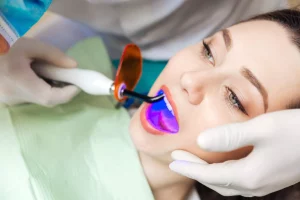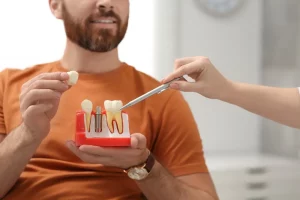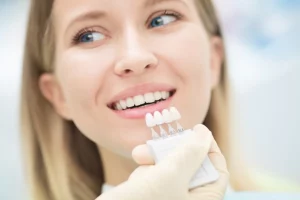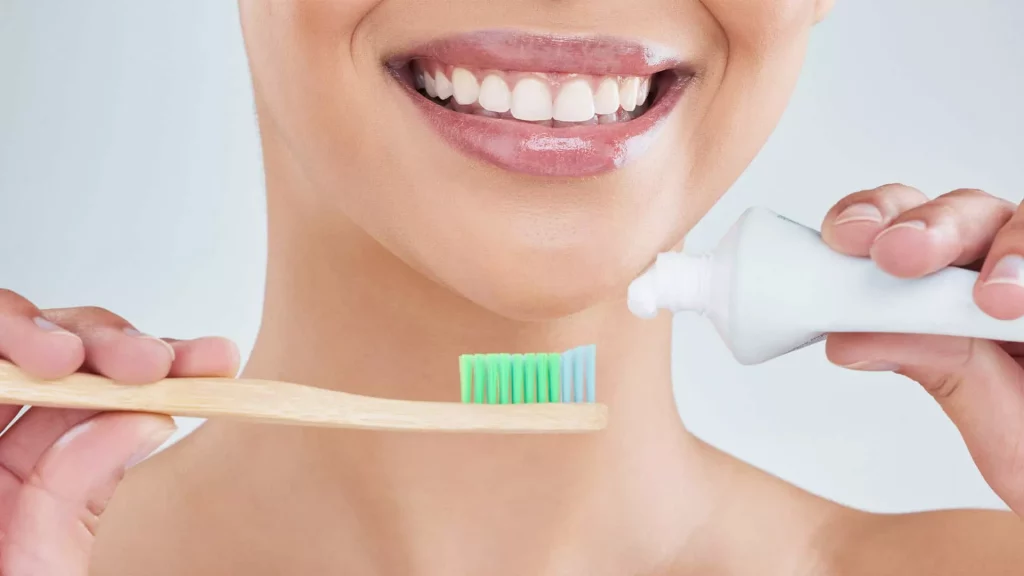Last Updated on: 10th February 2026, 06:26 am
Toothache treatments to relieve pain at home include saltwater rinses, cold compresses, clove oil, chamomile tea, and gentle garlic applications. These methods reduce discomfort temporarily and help you manage mild or intermittent pain. However, they do not replace professional dental care, so visiting a dentist is essential for lasting relief.
A toothache can start suddenly and hurt a lot. It can make it hard to eat, sleep, or even focus on your day. At Channel Islands Family Dental Office, we understand how painful and frustrating this can be. Every day, we see patients in Ventura, Oxnard, Newbury Park, Port Hueneme, and Santa Paula who are looking for quick relief.
Because we know how uncomfortable a toothache can be, we want to give you some simple tools to help control the pain temporarily while you wait to see a dentist. These home remedies should make you feel a little better and manage the discomfort until professional care is available.
Table of Contents
ToggleWhat causes a toothache?
A toothache can happen for many reasons. Sometimes it is simple, and sometimes it is more serious. At Channel Islands Family Dental Office, we see patients every day in Ventura, Oxnard, Newbury Park, Port Hueneme, and Santa Paula. We check the cause carefully so that the problem does not get worse.
Common causes of toothache include:
- tooth decay (cavities)
- damaged or loose fillings
- worn tooth enamel
- pulpitis (inflammation of the tooth pulp)
- abscess (infection at the root)
- trauma or injury to the teeth
- grinding or clenching teeth (bruxism)
- wisdom teeth pushing through or stuck (pericoronitis)
- gum disease, which exposes the roots
All these problems need professional care. Home remedies may help temporarily, but they do not solve the problem.
What types of toothache are there?
Toothaches do not always feel the same. Recognizing the type of pain helps you understand how urgent it is and when to see a dentist.
- Temporary pain: happens with hot, cold, sweet foods, or brushing. Usually means early cavities or sensitive teeth. Home remedies may help for a short time.
- Constant pain: does not go away and may get worse. Often means infection, abscess, or pulpitis. Constant pain should never be ignored.
What are other symptoms of a toothache?
A toothache can cause more than pain in the tooth. You may notice:
- swelling of the tooth, gum, or jaw
- bleeding or pus near a tooth or gum
- headaches
- bad taste or bad breath
- fever or swollen glands
Sometimes tooth pain comes from other parts of the body, like sinus problems, jaw muscles, certain headaches, or rarely, heart or nerve issues.
What are some toothache treatments to relieve pain at home?
Home care may temporarily reduce pain and make you more comfortable while waiting to see a dentist. These are some of the most common toothache treatments to relieve pain.
Note: Home remedies are only for temporary relief. If your pain is constant, severe, or comes with swelling, fever, or pus, see a dentist immediately.
Cold compress: reduces swelling and numbs pain.
- Wrap ice in a clean cloth and place it on your cheek near the aching tooth for 15–20 minutes.
- Repeat a few times a day, leaving at least 10 minutes between applications to protect your skin.
Saltwater rinse: salt has antiseptic and healing properties.
- Dissolve 1 teaspoon of salt in a glass of warm water.
- Swish for 30–60 seconds and spit out.
- Repeat 2–3 times per day as needed.
Clove oil: contains eugenol, a natural antibacterial and anesthetic.
- Apply a few drops to a cotton ball and place it on the sore tooth.
- Make a paste with ground cloves and a little water, put it in a tea bag, and place it on the tooth.
- Mix clove oil with warm water for a rinse, swish for a few seconds, then spit out.
Chamomile tea: has calming and anti-inflammatory effects.
- Steep a tea bag in water for 2–3 minutes, let it cool to a warm temperature.
- Place the warm tea bag on the affected tooth or use it as a rinse.
- Repeat several times daily for temporary relief.
Hydrogen peroxide rinse: reduces plaque and gum inflammation.
- Mix equal parts hydrogen peroxide and water.
- Rinse for 30–60 seconds, then spit out.
Note: This is not suitable for children due to the risk of swallowing.
Garlic: contains allicin, which is antibacterial and analgesic.
- Crush a garlic clove into a paste and mix with a little salt.
- Apply to the sore tooth or nearby gum.
- Alternatively, chew a garlic clove gently if tolerated.
Thyme: strong antibacterial and antioxidant.
- Boil fresh thyme in water for 2–3 minutes and let it cool; use as a rinse.
- Place diluted thyme essential oil on a cotton ball and apply to the tooth.
Vanilla Extract: the alcohol in vanilla acts as a temporary anesthetic.
- Apply with a cotton swab on the tooth several times a day.
- Can also be diluted in water for a mouth rinse.
Warm Compress: for jaw or muscle pain, not dental pain.
- Relax jaw muscles and reduce pain signals.
- Use a warm sock filled with rice or seeds, microwave 1–2 minutes, place on the affected side for 10–15 minutes.
These home remedies help by reducing swelling and inflammation, numbing or calming the pain temporarily, killing some bacteria in the mouth, relaxing jaw muscles and reducing pressure.
Note: These remedies do not fix the cause of a toothache. They only make it easier to handle until professional care.
What over-the-counter options can I use?
If home remedies are not enough, some OTC medications may help:
- Ibuprofen: reduces pain and inflammation.
- Acetaminophen (Paracetamol): for pain relief.
- Topical anesthetic gels: contain benzocaine to numb the area temporarily (up to 2 hours). Use only 1–2 days without consulting a dentist.
Note: Always read instructions and check for interactions with other medications. When in doubt, consult a healthcare professional.
When can I use home remedies safely?
You can try home remedies if you have:
- mild or intermittent tooth pain
- sensitivity from hot, cold, or sweet foods
- temporary discomfort after a dental cleaning or new filling
When should I avoid home remedies?
Do not rely on home remedies if you have:
- severe or constant pain
- swelling in your face, gums, or jaw
- signs of infection, like pus or bad taste in your mouth
- fever or swollen glands
- trauma or injury to the tooth
When should I seek emergency care for a toothache?
Some toothaches require immediate professional help. Seek urgent care if you notice:
- facial swelling
- fever
- difficulty breathing or swallowing
Do not try to treat severe symptoms at home—call a dentist or go to the emergency room immediately.
How can I prevent a toothache?
The best way to avoid tooth pain is prevention. Simple steps can help keep your teeth healthy and pain-free:
- Maintain good oral hygiene.
- Brush teeth twice a day and floss.
- Limit sugary or acidic foods.
- Attend regular dental check-ups.
Even though home remedies and toothache treatments to relieve pain temporarily reduce discomfort, they cannot replace professional dental care.
At Channel Islands Family Dental Office, we serve patients in Ventura, Oxnard, Newbury Park, Port Hueneme, and Santa Paula. We recommend visiting a dentist for any tooth pain – even mild discomfort – to diagnose and treat problems early.
Prevention is the best cure. Early dental care ensures your smile stays healthy, strong, and pain-free.
FAQs
You should visit a dentist if the pain is constant, severe, or comes with swelling, pus, fever, or difficulty breathing. Even mild or intermittent pain should be checked to prevent serious problems. Early treatment is always safer and more effective.
Voice and Search Snippets (Q&A)
References
1. American Dental Association. (2024, February 2). Oral Analgesics for Acute Dental Pain. https://www.ada.org/resources/research/science-and-research-institute/oral-health-topics/oral-analgesics-for-acute-dental-pain
2. Cronkleton, E. (2025, April 23). 11 home and natural remedies for toothache pain. Healthline. https://www.healthline.com/health/dental-and-oral-health/home-remedies-for-toothache
3. Mayo Clinic. (2024, June 7). Toothache: First aid. https://www.mayoclinic.org/first-aid/first-aid-toothache/basics/art-20056628
4. Seed, S. (2024, March 23). Toothache Relief and Home Remedies. WebMD. https://www.webmd.com/oral-health/home-remedies-toothache
5. WebMD. (2025, December 2). An overview of toothaches. https://www.webmd.com/oral-health/toothache


















